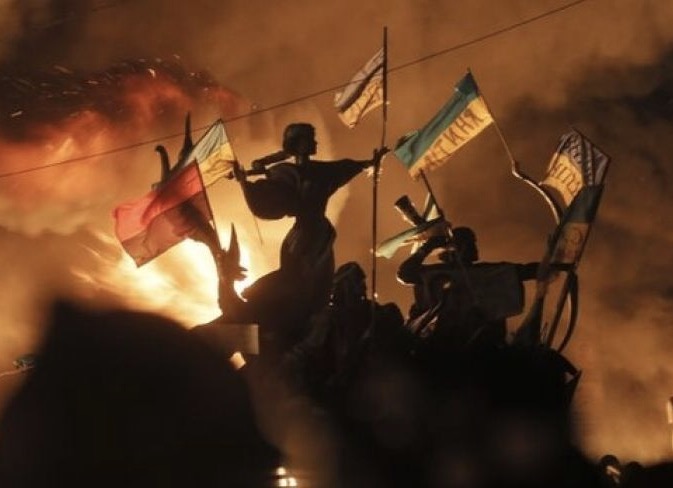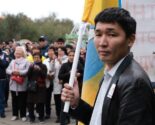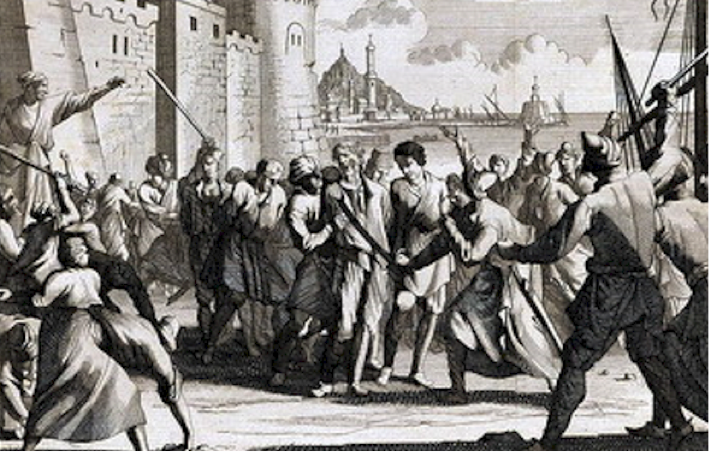EUROVISION
Jamala’s victory at the Eurovision with her song “1944” kick-starts the media to take an interest in the tragic fate of the Crimean Tatars. We are once again talking about the deportation of 200,000 Tatars by Stalin and the persecutions that rage even today against them. We recall that the Russians use the same methods of intimidation as in the North Caucasus. Arrests, torture, disappearances and murders are no longer rare in the Crimea. The Mejlis council was dissolved. The expression “hybrid” deportation is used with a reference to “Putin’s hybrid war” in Eastern Ukraine. 15,000 Tatars have sought refuge in the Ukraine. In Crimea, some Tatars are prosecuted for links to Islamic terrorism because they belong to the Pan-Islamic movement, Hizb ut-Tahrir, banned in Russia since 2004 but still legal in Ukraine. Even if some Tatars try to work with the new Russian administration (the Kyrym movement), the great majority of Tatars perceive Russians as invaders and remain confident that Crimea will re-join Ukraine someday.
A year later, The Economist writes another article on the Eurovision and its consequences for Russian-Ukrainian relations. By banning the disabled Russian contestant from Ukraine – because the singer has contravened Ukrainian law which refuses right of entry to any person who promotes the Crimea’s annexation to the Russian Federation – Ukraine has caused a diplomatic row. In fact, this ban suits Russian propaganda which portrays Ukrainians as monsters for banning a disabled person from singing in Kyiv. The Economist says ironically that this Russian version of events is so much easier to report than to speak the truth: that Ukrainians do not like to see their country being torn apart by a stronger neighbour.
Similarly, this small diplomatic storm is convenient for the government in Kyiv by diverting attention from the failures of the Revolution.
Historical Memory Laws
The British press call them “decommunisation” laws. The French media were particularly interested in what they call ‘les lois mémorielles” which they reject in their entirety because the new laws make no distinction between Nazism and Bolshevism. In Causeur, André Markowicz says with sarcasm that Ukraine is a western and anti-Russian democracy in the making where, paradoxically, any questioning of the new historical “truth” is punishable by imprisonment. It makes no sense that The Soviet Union and Nazi Germany are set side by side. According to Markowicz, there was no Treblinka under Stalin. One can’t deny the Holodomor, however it was not a genocide against the Ukrainian people, but a response to a peasant revolt fighting collectivization. According to Causeur, these laws are made to divert attention from the economic crisis and the misery of the population resulting from Angela Merkel’s economic demands. One must find a common enemy. Thus we are witnessing the absolute triumph of Putin, a Russian nationalist, who does exactly the same thing, but on a far larger scale.
Mediapart, whose political views are the polar opposite of those of Causeur, is also very critical of these new Historical Memory Laws, of which Odesa has become the symbol, with the statue of Darth Vader replacing the one of Lenin. It seems that the Ukrainian historiography that has been around for a very long time in Western Ukraine – which makes not the slightest distinction between the criminal character of the Nazi and Soviet regimes – has now reached Kyiv. Ukraine is following in the same footsteps as the countries of central Europe in the 1990s. One could say that the remaining Ukrainians who are still nostalgic for the USSR, people who gave their best years to the former Union, are now insignificant; they represent mere pensioners. For Laurent Geslin and Sébastien Gobert, the unification of the Ukrainian state and the Ukrainization of national history have been accelerated by Vladimir Putin’s hybrid war in the Donbas.
Mediapart writes that Ukraine has always had an inferiority complex in the face of Russian historiography. In a country ravaged by an endless economic crisis, bled by endemic corruption and a predatory political class, the decommunisation laws seem to be a way of distracting Ukrainians. This issue about the de-sovietisation laws is bound to get a reaction.
In conclusion, the question arises whether the invention of a new mythology has the power to bring the citizens of Ukraine together. According to Mediapart, Ukrainian identity already exists, in both Ukrainian and Russian speakers. It is trade, prosperity and welfare that will contribute to a new way of living together.
The ban on Russian social networks
The British condemn the ban on Russian social networks in Ukraine. This populist measure is an obstacle to freedom of expression because Russian platforms such as VKontact or Odnoklassniki do not threaten the Ukrainian state. On the contrary, VKontact made it possible to circulate the photos proving the Russian military presence in Ukraine. These networks also allow communication between people living on both sides of the front. It is an ineffective anti-Russian measure which helps the President, whose popularity is waning, to prepare for his 2019 election campaign. In France, Le Courrier International publishes an article from Ekonomitchna Pravda in which concerns are raised about the emergence in Ukraine of a cyber dictatorship, like in China, North Korea and Russia, although the purpose of thwarting Russian propaganda is acknowledged.
Nevertheless, right from the beginning of the conflict, the BBC points out that Ukrainian journalists, although anti-Russian, are much more moderate than their Russian counterparts and that in Ukraine, dissenters have the right to speak out.


